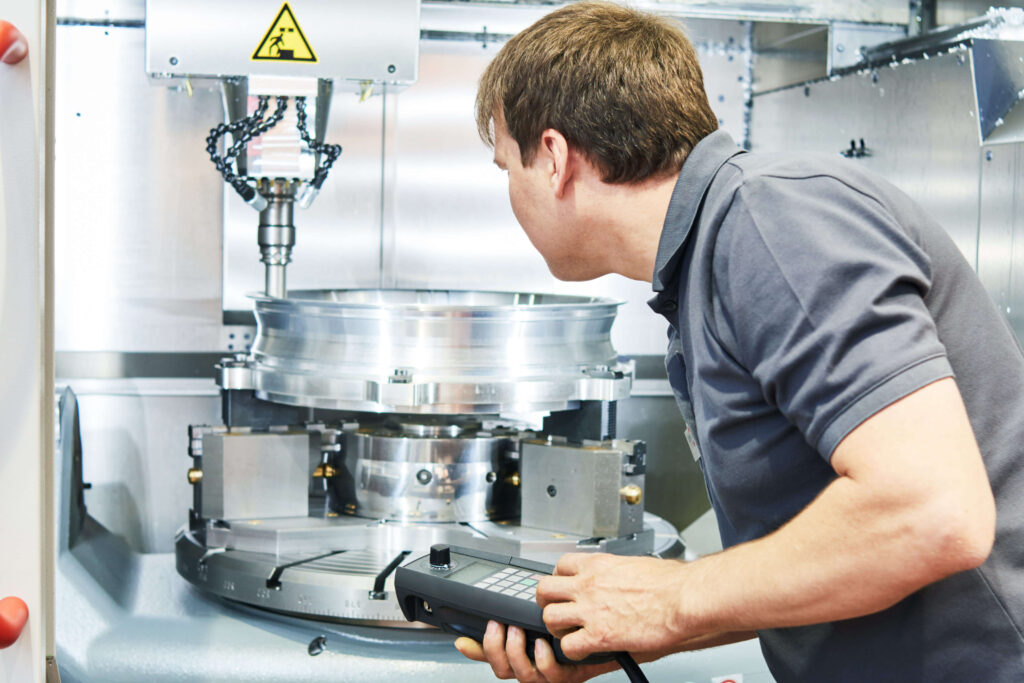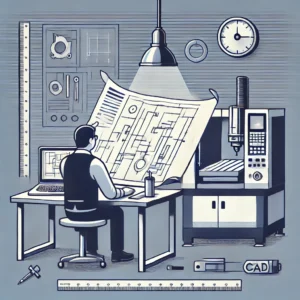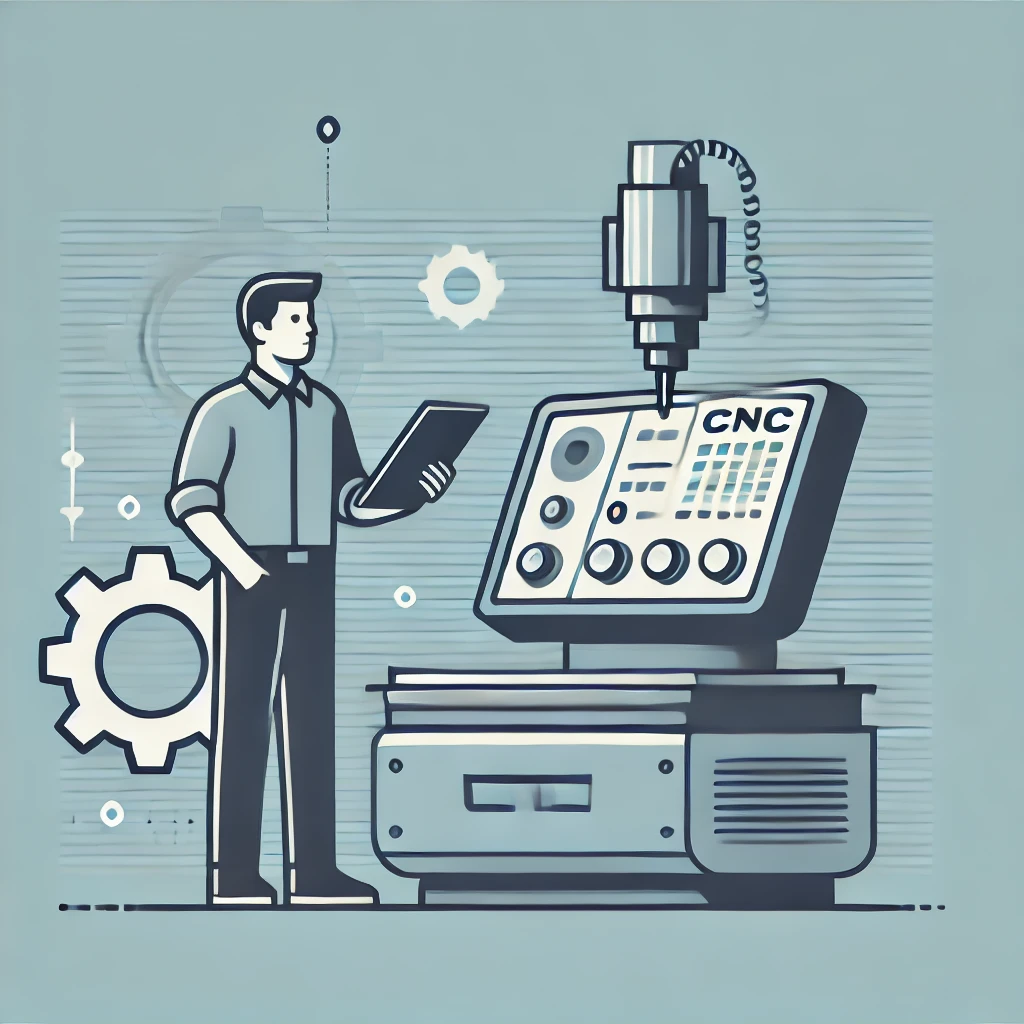Key Takeaways
- CNC machinists play a vital role in modern manufacturing
- Key skills include CNC programming, blueprint reading, and precision machining
- Career paths include CNC operator, programmer, and engineer
- The industry offers stable job growth and competitive salaries
- Certifications and hands-on training enhance career prospects
Introduction
A CNC machinist plays a crucial role in modern manufacturing, operating and programming computer-controlled machines to produce precision parts.
These professionals ensure accuracy, efficiency, and consistency in machining processes, making them essential to industries that require high-quality components.
CNC machinists work with a variety of materials, including metals, plastics, and composites, shaping them into finished products for industries like aerospace, automotive, and medical manufacturing.
Their expertise in reading blueprints, setting up machines, and troubleshooting production issues helps maintain smooth manufacturing operations.
The demand for CNC machinists continues to grow as manufacturers rely on advanced automation and precision machining to stay competitive.
With technological advancements, machinists now work with sophisticated software and AI-driven tools, making continuous skill development crucial.
This profession offers stable career opportunities, competitive salaries, and pathways to specialization in CNC programming, quality control, and engineering roles, making it a rewarding career choice.
Understanding The CNC Machinist Role

CNC machinists are responsible for operating and maintaining computer-controlled machines that manufacture precision parts.
Their role requires technical expertise, attention to detail, and problem-solving skills to ensure accuracy and efficiency in production.
As manufacturing technology advances, CNC machinists must continuously adapt to new software, tools, and automation techniques to remain competitive in the industry.
Primary Responsibilities
1. Operating and programming CNC machines
CNC machinists set up and operate various CNC machines, including lathes, mills, and grinders. They input programming codes, adjust machine settings, and monitor production to ensure components meet exact specifications.
They also troubleshoot programming errors and make real-time adjustments to maintain efficiency.
2. Interpreting technical drawings and blueprints
Machinists must read and understand complex blueprints, CAD models, and schematics to determine the necessary machine operations, cutting paths, and tolerances required for manufacturing parts.
This skill ensures the final product matches engineering specifications.

3. Performing routine machine maintenance
Regular maintenance is essential to keep machines running smoothly. CNC machinists inspect tools, replace worn-out parts, lubricate components, and troubleshoot any mechanical or programming issues to prevent production delays.
Proper maintenance also extends the lifespan of expensive machinery and reduces downtime.
Work Environment
- Typical industries employing CNC machinists
CNC machinists are in demand across multiple industries, including aerospace, automotive, medical device manufacturing, defense, and industrial equipment production. These industries require precise, high-quality components that only skilled machinists can produce. The growing reliance on automation has further increased the demand for highly trained machinists. - Common workplace settings and conditions
Most CNC machinists work in machine shops, manufacturing plants, and high-tech production facilities. The work environment is often fast-paced, requiring strict adherence to safety protocols. While many tasks are automated, machinists still perform hands-on work, such as adjusting machines, inspecting parts, and troubleshooting issues. Depending on the employer, machinists may work in shifts, including evenings and weekends, to meet production demands. CNC machinists must also wear protective gear, including safety glasses, gloves, and ear protection, to prevent injuries in an industrial setting.
CNC machinists play a critical role in modern manufacturing, ensuring precision, quality, and efficiency in production processes. Their expertise keeps industries running smoothly while advancing manufacturing technology.
Essential Skills and Qualifications
Becoming a successful CNC machinist requires a combination of technical expertise and soft skills to ensure efficiency, accuracy, and productivity in manufacturing operations.
These skills help machinists handle complex machinery, troubleshoot issues, and collaborate effectively in fast-paced industrial environments.
Technical Skills
- Proficiency in CNC programming and operation
CNC machinists must have hands-on experience with G-code programming and CNC machine operation. Understanding how to set up machines, select appropriate tools, and execute precise cuts is essential for producing high-quality components. Familiarity with software such as Mastercam, Fusion 360, and AutoCAD enhances a machinist’s ability to program and optimize machine performance. - Understanding of machining processes and materials
A CNC machinist needs to be well-versed in different machining techniques, including milling, turning, grinding, and drilling. Knowledge of metals, plastics, and composite materials ensures proper tool selection and machining parameters, preventing material defects and improving efficiency. - Ability to read and interpret blueprints
Machinists must accurately interpret technical drawings, CAD designs, and engineering schematics to ensure that manufactured parts meet specifications. This skill involves understanding geometric dimensioning and tolerancing (GD&T), identifying machining sequences, and making precise adjustments to achieve exact measurements.
Soft Skills
- Attention to detail and precision
CNC machining demands high levels of precision. Even minor errors in setup or programming can lead to costly defects. A meticulous approach ensures tolerances are maintained and quality standards are met. - Problem-solving abilities
CNC machinists frequently encounter machine malfunctions, programming errors, and material inconsistencies. Strong analytical skills help identify issues, adjust processes, and maintain smooth production without unnecessary downtime. - Effective communication and teamwork
Machinists collaborate with engineers, supervisors, and quality control teams to ensure smooth production. Clear communication helps troubleshoot problems, optimize workflows, and implement process improvements.
Pathways to Becoming a CNC Machinist
Becoming a CNC machinist requires a combination of formal education, hands-on training, and industry experience.
The pathway to this career varies, but most professionals start with foundational learning before advancing through certifications and specialized training.
Educational Requirements
- Relevant degrees or certifications
While a college degree is not always required, many CNC machinists complete associate degrees or technical diplomas in machining technology, manufacturing, or industrial engineering. Certifications such as those from the National Institute for Metalworking Skills (NIMS) or American Machine Tool Distributors’ Association (AMTDA) can enhance job prospects. - Importance of hands-on training and apprenticeships
Hands-on experience is critical in CNC machining. Many aspiring machinists begin through vocational schools, apprenticeships, or on-the-job training programs offered by manufacturing companies. Internships and mentorship programs help develop real-world machining skills, including programming, machine operation, and quality control.
Advancement Opportunities
- Potential career progression paths
CNC machinists can progress to CNC programmers, machine shop supervisors, quality control inspectors, or manufacturing engineers with experience and additional training. - Specializations within the field
Machinists can specialize in CNC lathe operation, precision grinding, aerospace machining, or medical device manufacturing, depending on industry demand and personal interests.
Career Outlook and Opportunities
The demand for CNC machinists remains strong due to advancements in automation, precision engineering, and increased reliance on high-tech manufacturing.
Job Market Trends
- Demand for CNC machinists in various industries
Industries such as automotive, aerospace, medical manufacturing, and defense rely heavily on CNC machinists to produce high-precision parts. The growing emphasis on domestic manufacturing and automation continues to fuel job demand. - Impact of technological advancements on the profession
AI-driven machining, robotics, and IoT integration are transforming the CNC machining industry. Machinists with expertise in computer-aided design (CAD) and CNC programming will have a competitive advantage as smart factories become more prevalent.
Salary Expectations
- Average salary ranges based on experience and location
Entry-level CNC machinists typically earn $35,000 – $45,000 per year, while experienced professionals and CNC programmers can earn $60,000 – $80,000 annually. Salaries vary based on location, industry, and skill level. - Factors influencing earning potential
Machinists who specialize in complex programming, operate advanced multi-axis machines, or work in high-tech industries command higher salaries. Certifications and additional training in automation and robotics can further enhance earning potential.
With strong job stability and opportunities for growth, CNC machining remains a lucrative and in-demand profession in modern manufacturing.
FAQs
1. What industries employ CNC machinists?
CNC machinists are essential in industries that require precision manufacturing, including aerospace, automotive, medical device production, defense, and industrial equipment manufacturing.
These industries depend on CNC technology to produce high-quality, custom-engineered parts with tight tolerances.
2. What is the difference between a CNC operator and a CNC machinist?
A CNC operator primarily loads raw materials, runs pre-programmed machines, and monitors production for defects.
A CNC machinist, on the other hand, is responsible for programming, setting up, and adjusting machines, as well as troubleshooting errors and optimizing production efficiency.
3. How long does it take to become a CNC machinist?
Becoming a CNC machinist typically takes 1 to 3 years, depending on the training path.
Some enter the field through vocational schools or apprenticeship programs, while others gain experience through on-the-job training. Advanced roles, such as CNC programming or engineering, may require additional education.
4. What certifications are beneficial for CNC machinists?
Certifications from organizations like the National Institute for Metalworking Skills (NIMS), Haas Certification Program, and the Manufacturing Skill Standards Council (MSSC) can enhance job prospects.
These credentials validate skills in CNC programming, safety procedures, and machining operations.
5. Is there a demand for CNC machinists in the current job market?
Yes, the demand for CNC machinists remains strong due to the ongoing expansion of automation, precision manufacturing, and domestic production.
As industries embrace smart manufacturing and AI-driven machining, skilled CNC professionals will continue to be highly sought after.

